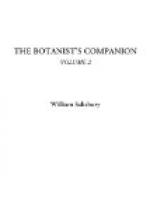252. Punica Granatum. Pomegranate. Rind of the Fuit. L. E. D.—This fruit has the general qualities of the other sweet summer fruits, allaying heat, quenching thirst, and gently loosening the belly. The rind is a strong astringent, and as such is occasionally made use of.
253. Pyrus Cydonia. Quince. The Kernels. L.—The seeds abound with a mucilaginous substance, of no particular taste, which they readily impart to watery liquors: an ounce will render three pints of water thick and ropy like the white of an egg. A syrup and jelly of the fruit, and mucilage of the seeds, used to be kept in the shops.
254. QUEROUS pedunculata. Oak. Bark. L. E. D.—This bark is a strong astringent; and hence stands recommended in haemorrhagies, alvine fluxes, and other preternatural or immoderate secretions.
255. Rhamnus catharticus. Buckthorn. Berries. L. E.—Buckthorn-berries have a faint disagreeable smell, and a nauseous bitter taste. They have long been in considerable esteem as cathartics; and celebrated in dropsies, rheumatisms, and even in the gout; though in these cases they have no advantage above other purgatives, and are more offensive, and operate more churlishly, than many which the shops are furnished with: they generally occasion gripes, sickness, dry the mouth and throat, and leave a thirst of long duration. The dose is about twenty of the fresh berries in substance, and twice or thrice this number in decoction, an ounce of the expressed juice, or a dram of the dried berries.
256. Rheum palmatum. Turkey rhubarb. Roots. L. E. D.—Rhubarb is a mild cathartic, which operates without violence or irritation, and may be given with safety even to pregnant women and to children. In some people, however, it always occasions severe griping. Besides its purgative quality, it is celebrated for an astringent one, by which it strengthens the tone of the stomach and intestines, and proves useful in diarrhoea and disorders proceeding from a laxity of the fibres. Rhubarb in substance operates more powerfully as a cathartic than any of the preparations of it. Watery tinctures purge more than the spirituous ones; whilst the latter contain in greater perfection the aromatic, astringent, and corroborating virtues of the rhubarb. The dose, when intended as a purgative, is from a scruple to a dram or more.
The Turkey rhubarb is, among us, universally preferred to the East India sort.
The plant is common in our gardens, but their medicinal powers are much weaker than in those from abroad.
Rhododendron Chrysanthemum. Yellow-flowered Rhododendron. See No. 290.
257. Rhus Toxicodendron. Poison-oak. Leaves. L. E.—Of considerable use in paralytic affections, and is much used in the present day.
It is, however, often substituted by the Rhus radicans, which has not the medical properties that this plant has; and it is to be regretted that the leaves of both species are so much alike, that, when gathered, they are not to be distinguished.




